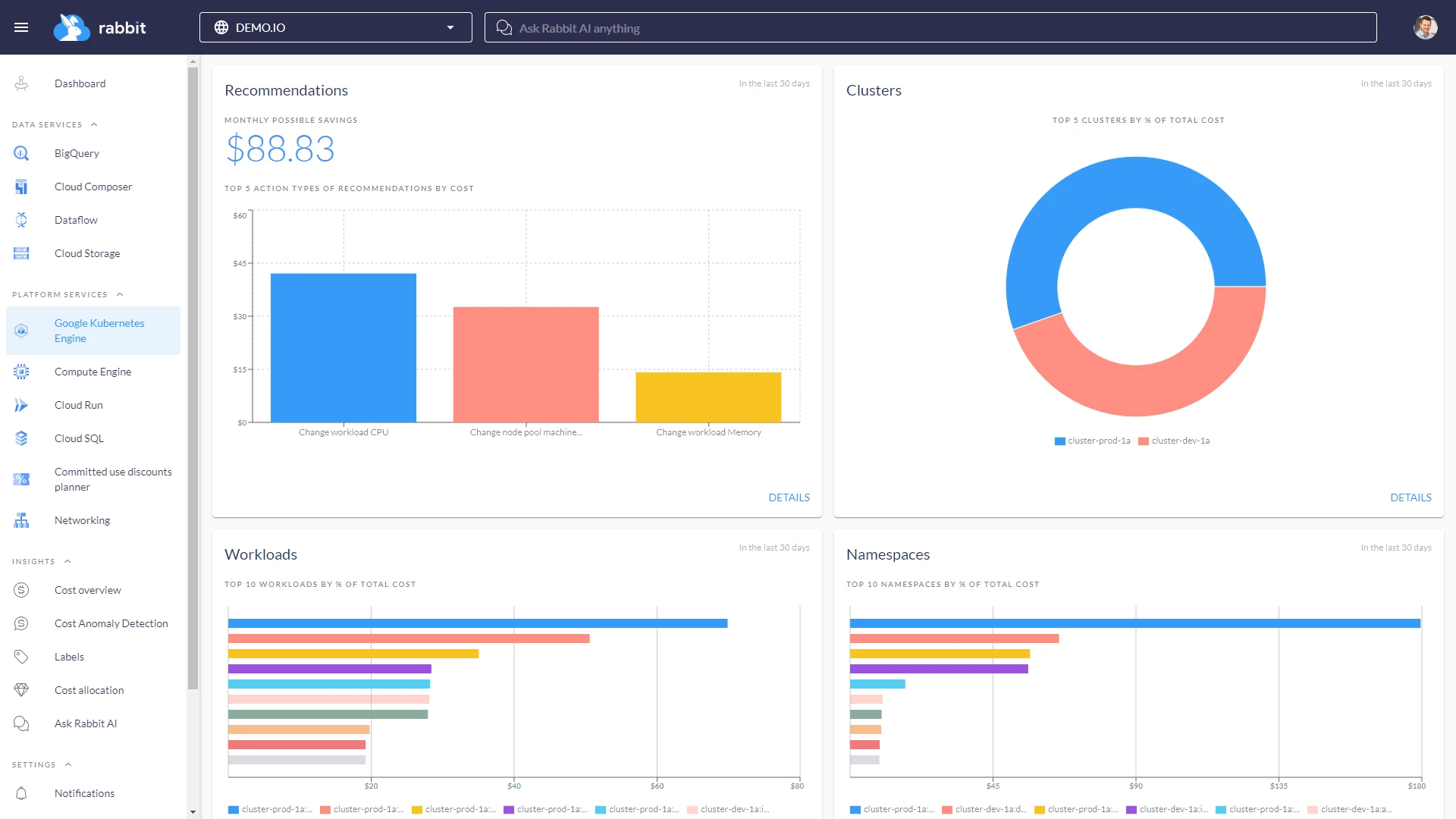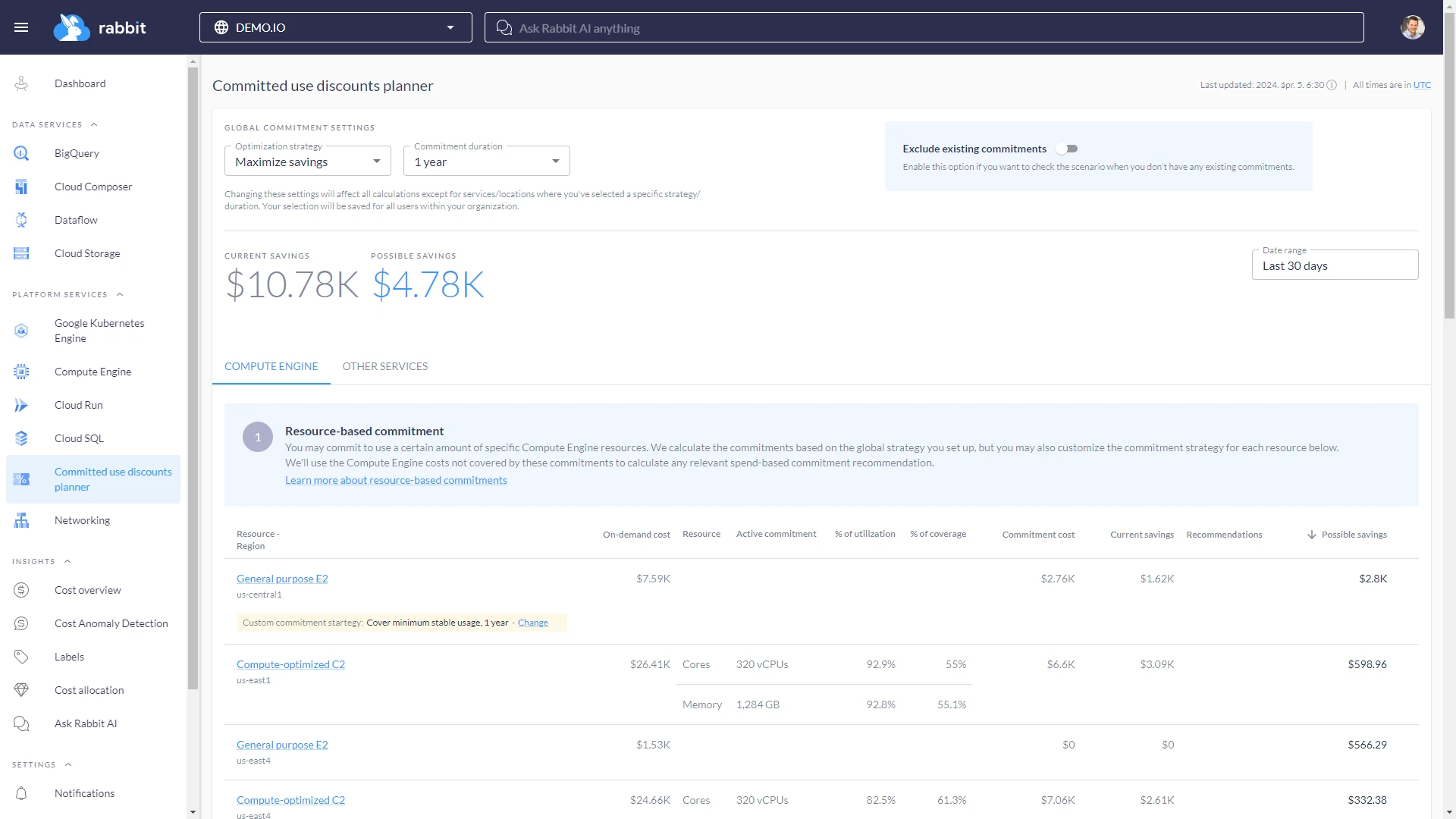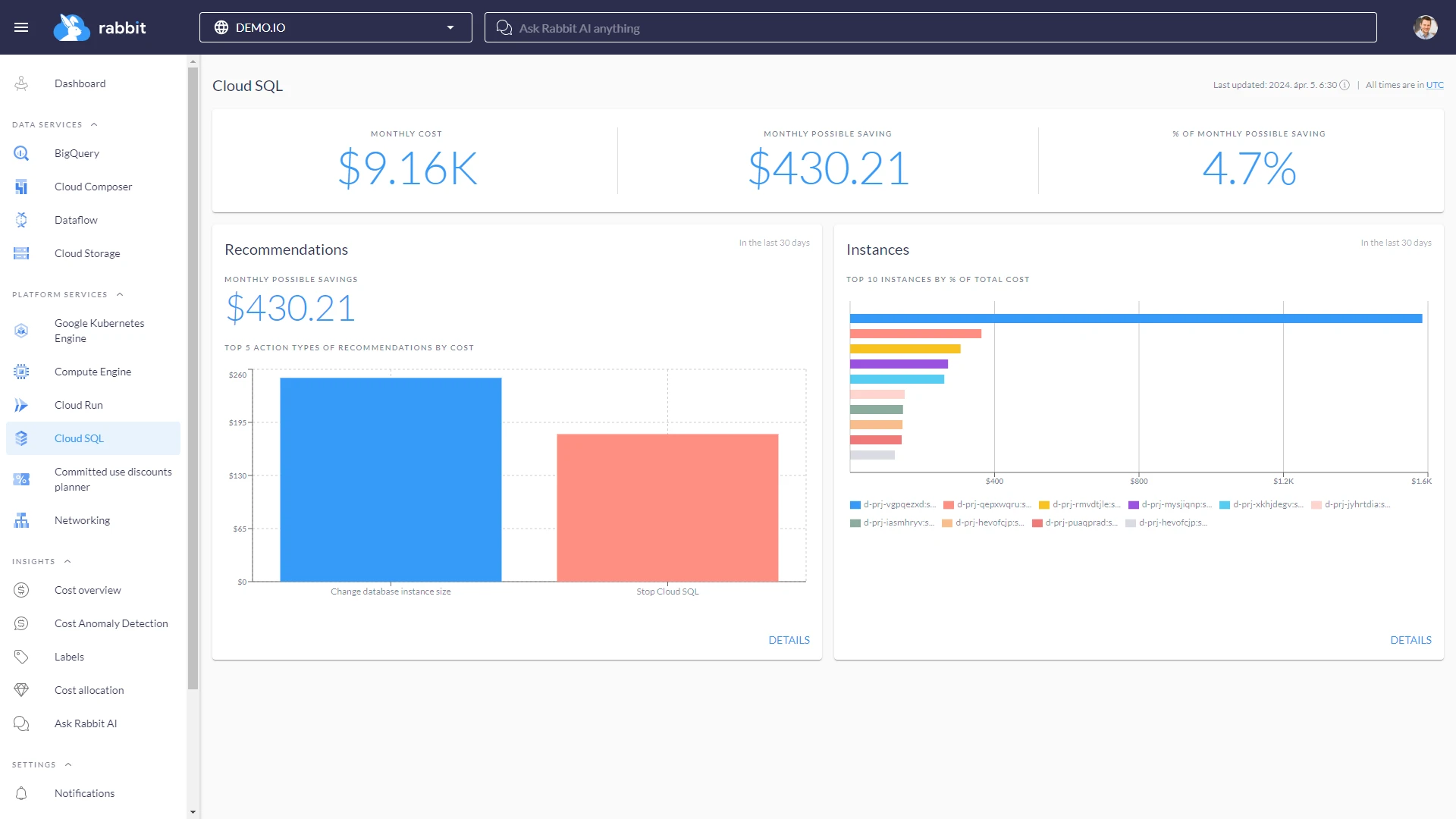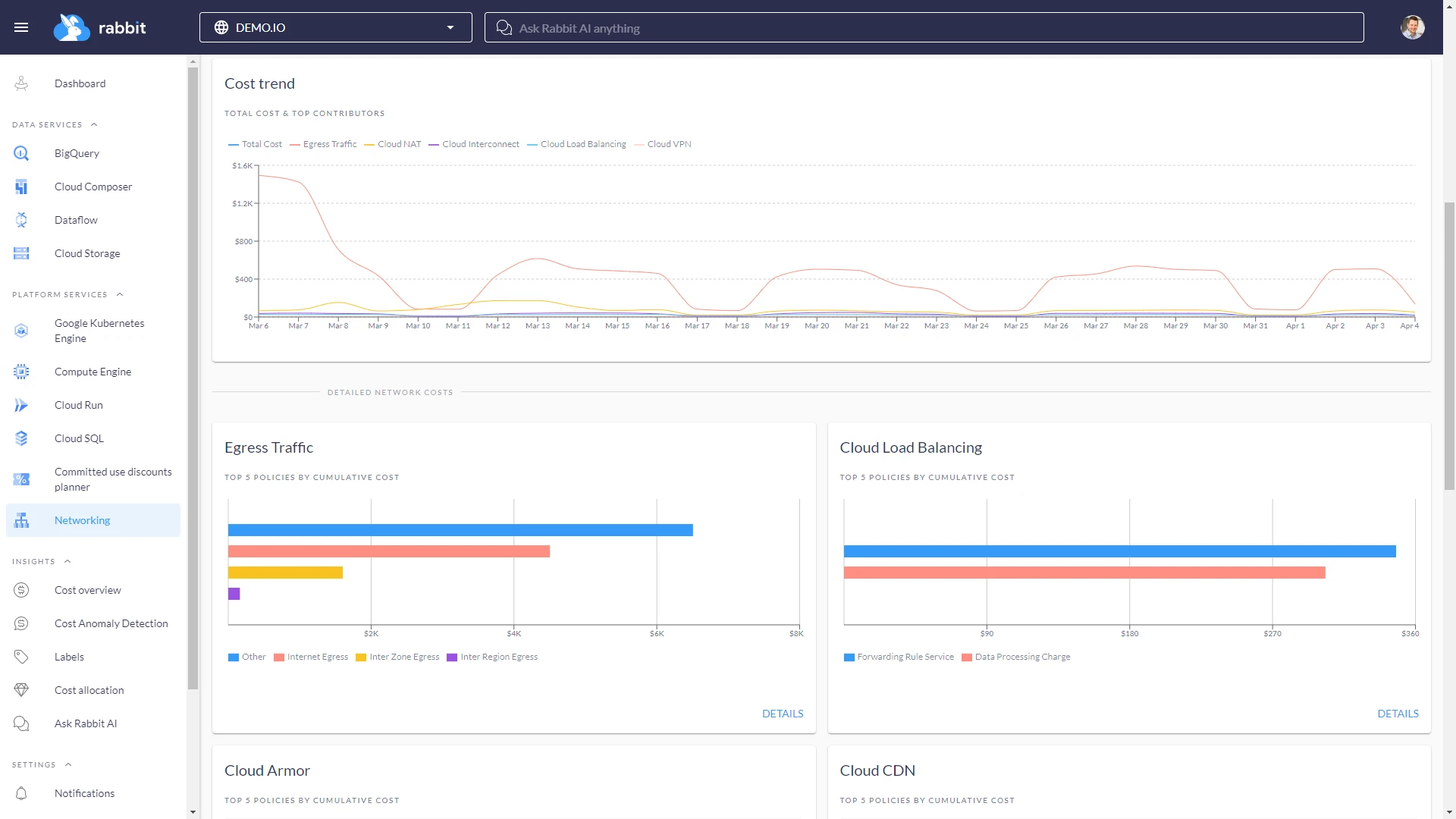Features
PROFor Platform Teams
GKE, Compute Engine, Cloud SQL, Cloud Run are services on GCP that can generate high levels of wastage. Our service level insights and optimization features like recommendations for GKE right machine types or optimization based on usage history can save you headache and money on a daily basis.
Don’t waste time, money, and resources building dashboards to find blindspots and optimization opportunities. With Rabbit you can easily understand your cloud bill and optimize every aspect of it, even choosing the right commitment from flexible to resource-based.
Google Kubernetes Engine (GKE)
Rabbit gives you a more granular cost breakdown on the cluster, namespace, workload (pod), and node pool level.
Based on the past usage of workloads Rabbit provides actionable recommendations to fine-tune the requested resources or may change the machine type of the node pools to have better utilization of nodes.
Rabbit uses pure GCP APIs to provide that information, there is no need to deploy any additional service into your production cluster.
Committed Use Discounts Planner
CUD planner helps to make commitment decisions easy and accurate.
Instead of guessing, make data-driven decisions based on historical data combined with forecast data and save 30% or more on committed usage.
CUD supports resource- and spend-based commits for Compute Engine and helps you find the best mix that fits your business needs.
Networking
Rabbit provides clarity and transparency regarding networking cloud costs.
Understanding networking costs is crucial because they are often the primary source of shared cost issues, such as how to allocate them between different teams, products, and services.
The goal of Rabbit is to provide clarity and transparency regarding cloud costs, particularly those related to networking. These costs can be extremely difficult to comprehend and identify. To gain a comprehensive understanding of networking costs, Rabbit collects all available information and presents it in an organized manner that enables prompt action to be performed.
Rabbit is available through Google Cloud Marketplace
It counts towards your GCP consumptions and easier to sign-up
Get in touch to start saving
We help businesses save 30-50% on their Google Cloud spending and provide full clarity on their costs.

Zoltán Guth
CTO


'%3e%3cg%3e%3cpath%20d='M116,57C116,40.443%20102.557,27%2086,27C69.443,27%2056,40.443%2056,57C56,73.557%2069.443,87%2086,87C102.557,87%20116,73.557%20116,57Z'%20style='fill:url(%23_Linear1);'/%3e%3cpath%20d='M93.663,63.249L99.207,68.793C99.437,69.022%2099.531,69.336%2099.491,69.634C99.527,69.863%2099.456,70.104%2099.28,70.28C99.104,70.456%2098.863,70.527%2098.634,70.491C98.336,70.531%2098.022,70.437%2097.793,70.207L92.249,64.663C90.158,66.433%2087.454,67.5%2084.5,67.5C77.873,67.5%2072.5,62.127%2072.5,55.5C72.5,48.873%2077.873,43.5%2084.5,43.5C91.127,43.5%2096.5,48.873%2096.5,55.5C96.5,58.454%2095.433,61.158%2093.663,63.249ZM83.5,60.5C83.5,61.052%2083.948,61.5%2084.5,61.5C85.052,61.5%2085.5,61.052%2085.5,60.5L85.5,56.5L89.5,56.5C90.052,56.5%2090.5,56.052%2090.5,55.5C90.5,54.948%2090.052,54.5%2089.5,54.5L85.5,54.5L85.5,50.5C85.5,49.948%2085.052,49.5%2084.5,49.5C83.948,49.5%2083.5,49.948%2083.5,50.5L83.5,54.5L79.5,54.5C78.948,54.5%2078.5,54.948%2078.5,55.5C78.5,56.052%2078.948,56.5%2079.5,56.5L83.5,56.5L83.5,60.5Z'%20style='fill:white;'/%3e%3cpath%20d='M118.515,38.266C121.791,43.968%20123.51,50.431%20123.5,57.007C123.49,63.583%20121.75,70.041%20118.456,75.732C115.162,81.424%20110.43,86.149%20104.733,89.434C99.036,92.719%2092.576,94.448%2086,94.448'%20style='fill:none;fill-rule:nonzero;stroke:rgb(21,22,58);stroke-opacity:0.12;stroke-width:1px;'/%3e%3cpath%20d='M48.5,56.791C48.528,50.235%2050.274,43.801%2053.563,38.13C56.853,32.459%2061.572,27.75%2067.25,24.472'%20style='fill:none;fill-rule:nonzero;stroke:rgb(155,81,224);stroke-opacity:0.8;stroke-width:1px;'/%3e%3c/g%3e%3c/g%3e%3cdefs%3e%3clinearGradient%20id='_Linear1'%20x1='0'%20y1='0'%20x2='1'%20y2='0'%20gradientUnits='userSpaceOnUse'%20gradientTransform='matrix(60,0,0,60,56,86.9629)'%3e%3cstop%20offset='0'%20style='stop-color:rgb(155,81,224);stop-opacity:0.8'/%3e%3cstop%20offset='1'%20style='stop-color:rgb(54,154,248);stop-opacity:1'/%3e%3c/linearGradient%3e%3c/defs%3e%3c/svg%3e)


